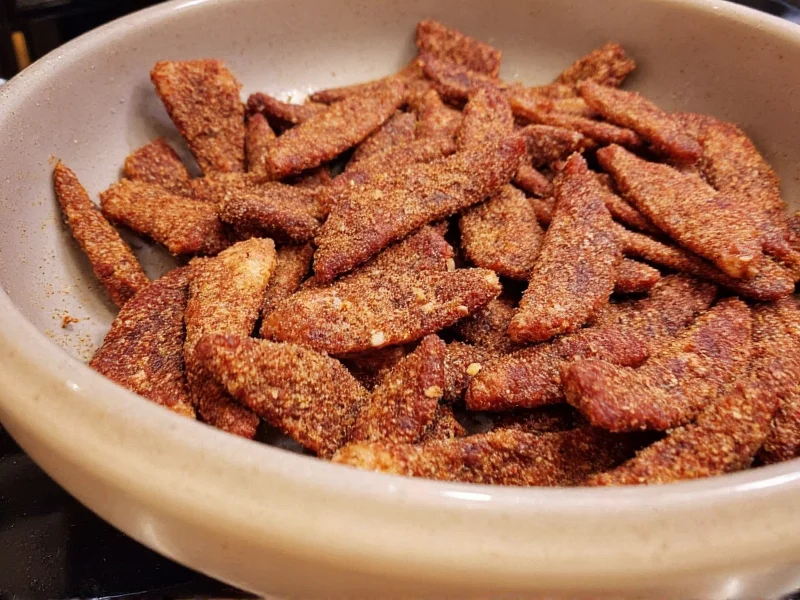The perfect basic jerky seasoning recipe combines 1/2 cup soy sauce, 1/4 cup Worcestershire sauce, 2 tablespoons brown sugar, 1 tablespoon garlic powder, 1 tablespoon onion powder, 1 teaspoon black pepper, 1 teaspoon smoked paprika, and 1/2 teaspoon cayenne pepper for heat. Mix with 1 pound of lean meat strips, marinate 4-12 hours, then dehydrate at 160°F (71°C) for 4-6 hours until dry but pliable. This balanced blend delivers savory, sweet, and spicy notes while ensuring safe preservation.
Why This Jerky Seasoning Recipe Works
Creating exceptional homemade jerky starts with understanding the science behind the seasoning. The right jerky seasoning recipe balances flavor development with food safety requirements. Soy sauce and Worcestershire provide umami depth while contributing to preservation through their salt content. Brown sugar caramelizes during dehydration, creating that signature jerky crust. Garlic and onion powders distribute evenly compared to fresh versions, ensuring consistent flavor throughout each piece.
Professional jerky makers emphasize the importance of precise salt-to-meat ratios for safety. Our recommended jerky seasoning mix contains approximately 3% salt by weight, meeting USDA guidelines for safe meat dehydration. This critical detail separates amateur attempts from consistently delicious, shelf-stable results. When preparing your homemade jerky seasoning mix, always use fresh spices for maximum flavor impact—stale spices dramatically reduce the final product's quality.
Essential Ingredients Breakdown
Understanding each component's role transforms your approach to jerky making. Here's why these specific ingredients create the best jerky rub recipe:
| Ingredient | Function | Substitution Options |
|---|---|---|
| Soy sauce (low sodium) | Provides salt content for preservation and umami flavor | Coconut aminos (for gluten-free), liquid aminos |
| Worcestershire sauce | Complex savory notes and tenderizing enzymes | Homemade Worcestershire substitute |
| Brown sugar | Caramelization during drying creates texture contrast | Maple syrup, honey (adjust liquid content) |
| Smoked paprika | Imparts smoky flavor without actual smoking | Chipotle powder (increases heat) |
| Curing salt (optional) | Prevents botulism in longer storage | None (reduce storage time to 1 week) |
Step-by-Step Preparation Guide
Follow these precise steps for perfect jerky every time. Start with 1-1.5 pounds of lean meat (top round or flank steak work best). Partially freeze the meat for 1-2 hours to simplify slicing against the grain into 1/4-inch thick strips. Uniform thickness ensures even drying—varying thickness causes some pieces to over-dry while others remain moist.
Combine all jerky marinade ingredients in a bowl, then add meat strips. Massage the mixture thoroughly to ensure complete coverage. Refrigerate in a sealed bag for 4-12 hours—never exceed 24 hours as the acid begins breaking down the meat excessively. Remove meat from marinade and pat dry with paper towels. Arrange strips on dehydrator trays without overlapping.
Dehydrate at 160°F (71°C) for 4-6 hours. Check periodically after 4 hours; properly dried jerky should bend without breaking and show no moisture when torn. For oven drying, use the lowest setting with the door propped open slightly using a wooden spoon. Rotate trays hourly for even drying. Never skip the critical cooling step—let jerky rest in a paper bag for 1-2 hours to equalize moisture before storage.
Popular Flavor Variations
Once you've mastered the basic jerky seasoning recipe, experiment with these professional variations. The spicy jerky seasoning mix adds 1 tablespoon crushed red pepper flakes and 2 teaspoons cayenne while reducing brown sugar to 1 tablespoon. For a sweet teriyaki jerky seasoning recipe, replace Worcestershire with pineapple juice and add 2 tablespoons mirin.
Our smoked honey bourbon variation incorporates 2 tablespoons bourbon and 3 tablespoons honey while increasing smoked paprika to 2 teaspoons. The Montreal steak spice version uses 2 tablespoons of commercial Montreal seasoning plus 1 teaspoon garlic powder. Each variation maintains the critical 3% salt ratio by adjusting soy sauce content accordingly. Remember that liquid ingredients affect drying time—wet marinades typically require 1-2 additional hours of dehydration.
Food Safety and Storage Guidelines
Understanding proper jerky curing salt measurements prevents foodborne illness. The USDA recommends maintaining at least 3% salt concentration in the final product. For extended storage beyond two weeks, include 1/4 teaspoon Prague Powder #1 (curing salt) per pound of meat. This small amount provides critical botulism protection without altering flavor.
Store homemade jerky in airtight containers with oxygen absorbers for maximum shelf life. Properly dried jerky lasts 1-2 months at room temperature, 6 months refrigerated, or 1 year frozen. Check for spoilage by examining for mold, off odors, or excessive moisture. Never consume jerky that feels slimy or shows visible mold—even small spots indicate complete product contamination. When in doubt, throw it out.
Troubleshooting Common Issues
Addressing jerky problems starts with understanding their causes. If your jerky cracks when bent, you've over-dried it—reduce time by 30-60 minutes next batch. Chewy jerky that doesn't tear cleanly indicates under-drying; return to dehydrator for additional hour. Sour flavors typically mean excessive marinating time—never exceed 12 hours for acid-based marinades.
White crystalline spots on finished jerky are salt deposits, not mold—perfectly safe to eat. If jerky develops mold within days of preparation, your dehydration temperature was too low or time insufficient. Always verify your dehydrator's actual temperature with a separate thermometer, as built-in gauges often read 10-15 degrees lower than reality. For consistent results, invest in a digital meat thermometer to check internal temperature during drying—safe jerky reaches 160°F internally.











 浙公网安备
33010002000092号
浙公网安备
33010002000092号 浙B2-20120091-4
浙B2-20120091-4